Will China invade Taiwan?
Beijing toughens rhetoric as increased incursions into Taiwan Straits risk 'accidental confrontation'
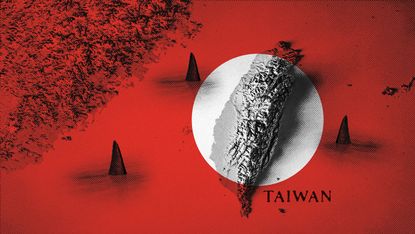
A senior Chinese official claimed Beijing "must resolutely fight 'Taiwan independence' separatism" in a ramping up of rhetoric towards the breakaway island as its president-elect prepares to take office in May.
Wang Huning, described by the Financial Times (FT) as the "most senior official in charge of Taiwan policy after President Xi Jinping", said China needed to "further grasp the strategic initiative to achieve the complete unification of the motherland". Wang was quoted in an official account by state news agency Xinhua speaking at the Communist Party's annual Taiwan work conference.
China and Taiwan were divided during a civil war in the 1940s, but Beijing has always maintained that the island should at some point be reclaimed. Beijing has described the newly re-elected government in Taipei as separatists, while refusing to rule out the use of force to bring it back into China’s direct orbit, making it arguably "the most dangerous place on Earth", said The Economist.
Subscribe to The Week
Escape your echo chamber. Get the facts behind the news, plus analysis from multiple perspectives.

Sign up for The Week's Free Newsletters
From our morning news briefing to a weekly Good News Newsletter, get the best of The Week delivered directly to your inbox.
From our morning news briefing to a weekly Good News Newsletter, get the best of The Week delivered directly to your inbox.
Risk of 'accidental confrontation'
Wang's language was "markedly tougher than pronouncements from last year's conference", said the FT. It "confirmed expectations that Beijing would step up efforts to push Taiwan into acquiescing to unification" after Lai Ching-te secured an unprecedented third consecutive term for Taiwan's ruling Democratic Progressive Party (DPP).
China has denounced Lai as a dangerous separatist, said the paper. "Analysts and Taiwanese politicians have predicted that Beijing will respond to his victory by intensifying efforts to isolate Taiwan internationally, using economic coercion against it and intimidating it with military manoeuvres, while seeking dialogue with political and social groups outside the DPP."
For decades the governments in Beijing and Taipei had an unwritten agreement not to cross an unofficial median line that divides the 110-mile-wide strait between them. Now, "China is crossing it almost daily, at sea and in the air", said Rupert Wingfield-Hayes, the BBC's Asia correspondent based in Taipei. CNN's Will Ripley said that Beijing's "persistent incursions" have provided a "powder keg".
Most recently, China's decision to increase regular patrols in waters near Taiwan's outlying islands is "an attempt to erode the long-standing status quo across the Taiwan Strait", said Voice of America (VOA). Beijing is trying to use the deaths of two Chinese fishermen drowned fleeing a Taiwanese coastguard boat this month to "create new facts" in the highly sensitive region and "upend rules of engagement" designed to prevent accidents.
China's "now-normalized presence around Taiwan raises the risk of an accidental confrontation", said defence analyst Ben Lewis in The New York Times, "but over the longer term, it has also gradually created a dangerous sense of complacency in Taipei and Washington, while giving China the crucial operational practice it might one day need to seize the island".
As well as the deterioration in cross-strait relations, there is a fear that China's "growing military modernization and assertiveness" could spark a conflict, said the Council on Foreign Relations (CFR).
Experts, however, "disagree about the likelihood and timing of a Chinese invasion", said the think tank. In 2021, the top US military commander in the Indo-Pacific warned that China could try to invade Taiwan within the next decade, while "others believe 2049 is a critical date", said the CRF as China's President Xi Jinping has "emphasised that unification with Taiwan is essential to achieving what he calls the Chinese Dream, which sees China's great-power status restored by 2049".
How would an invasion play out?
While most military analysts have played down the risk of an imminent invasion, the longer term threat is very real.
“Rather than a lightning attack, it would probably develop slowly, over months and even years”, said The Times, starting with Chinese cyber and missile attacks on military infrastructure followed by an air and sea embargo.
Taiwan's geographical position as an island separated from the mainland by a 110-mile-wide strait, its inhospitable shoreline and 245-mile mountain range running its length make any amphibious landing and ground invasion a logistical nightmare.
A less costly option would be for China to attempt a naval blockade, cutting the island off from food and energy imports.
"In two weeks, Taiwan would start to go dark," Richard Chen, Taiwan's former deputy defence minister, told The New Yorker. "No electricity, no phones, no internet. And people would start to go hungry."
Risk of escalation
If a conflict were to break out it would be "a catastrophe", reported The Economist. This is first because of "the bloodshed in Taiwan" but also because of the risk of "escalation between two nuclear powers", namely the US and China.
Beijing massively outguns Taiwan, with estimates from the Stockholm International Peace Research Institute showing that China spent about 23 times more on its military in 2021. But Taiwan has a defence pact with the US dating back to the 1954 Sino-American Mutual Defence Treaty, meaning the US could be drawn into the conflict.
It means any invasion “would be one of the most dangerous and consequential events of the 21st century”, said The Times, “an event that would make the Russian attack on Ukraine look like a sideshow by comparison” and which “could quickly have ramifications far beyond the island, drawing in Japan, South Korea, and the United States and other countries of Nato”.
Create an account with the same email registered to your subscription to unlock access.
Sign up for Today's Best Articles in your inbox
A free daily email with the biggest news stories of the day – and the best features from TheWeek.com
-
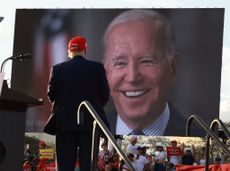 'Voters know Biden and Trump all too well'
'Voters know Biden and Trump all too well'Instant Opinion Opinion, comment and editorials of the day
By Harold Maass, The Week US Published
-
 Is the Gaza war tearing U.S. campuses apart?
Is the Gaza war tearing U.S. campuses apart?Today's Big Question Protests at Columbia University, other institutions, pit free speech against student safety
By Joel Mathis, The Week US Published
-
 DOJ settles with Nassar victims for $138M
DOJ settles with Nassar victims for $138MSpeed Read The settlement includes 139 sexual abuse victims of the former USA Gymnastics doctor
By Justin Klawans, The Week US Published
-
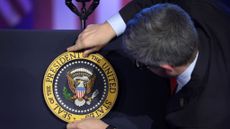 Who will win the 2024 presidential election?
Who will win the 2024 presidential election?In Depth Election year is here. Who are pollsters and experts predicting to win the White House?
By Justin Klawans, The Week US Published
-
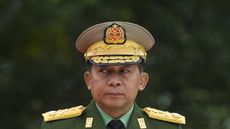 Myanmar: the Spring Revolution and the downfall of the generals
Myanmar: the Spring Revolution and the downfall of the generalsTalking Point An armed protest movement has swept across the country since the elected government of Aung San Suu Kyi was overthrown in 2021
By The Week Staff Published
-
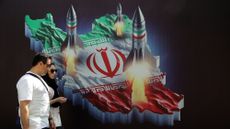 Israel hits Iran with retaliatory airstrike
Israel hits Iran with retaliatory airstrikeSpeed Read The attack comes after Iran's drone and missile barrage last weekend
By Peter Weber, The Week US Published
-
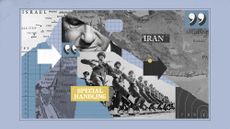 Is there a peaceful way forward for Israel and Iran?
Is there a peaceful way forward for Israel and Iran?Today's Big Question Tehran has initially sought to downplay the latest Israeli missile strike on its territory
By Sorcha Bradley, The Week UK Published
-
 Sudan on brink of collapse after a year of war
Sudan on brink of collapse after a year of warSpeed Read 18 million people face famine as the country continues its bloody downward spiral
By Peter Weber, The Week US Published
-
 How powerful is Iran?
How powerful is Iran?Today's big question Islamic republic is facing domestic dissent and 'economic peril' but has a vast military, dangerous allies and a nuclear threat
By Harriet Marsden, The Week UK Published
-
 US, Israel brace for Iran retaliatory strikes
US, Israel brace for Iran retaliatory strikesSpeed Read An Iranian attack on Israel is believed to be imminent
By Peter Weber, The Week US Published
-
 How green onions could swing South Korea's election
How green onions could swing South Korea's electionThe Explainer Country's president has fallen foul of the oldest trick in the campaign book, not knowing the price of groceries
By Sorcha Bradley, The Week UK Published